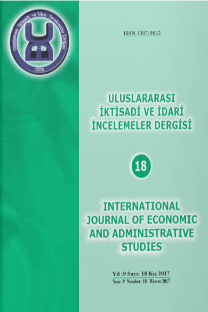DOĞRUDAN YABANCI YATIRIM VE TURİZM ARASINDAKİ NEDENSELLİK İLİŞKİSİ
Bu çalışma, 1995-2015 döneminde 113 ülkede, doğrudan yabancı yatırım (DYY) ve turizm arasındaki ilişkiyi incelemek için panel veri regresyon modeli uygulanmıştır. Bunun yanı sıra, kâğıt tüketim, ticarete açıklık ve insan sermayesi gibi göstergeleri denetlerken potansiyel nedensel ilişki ve turizm endüstrisi ile DYY arasındaki eşşizliği araştırmaya çalışmaktadır. Elde edilen sonuçlar, turizmin doğrudan yabancı yatırımlar üzerindeki önemli(olumlu) etkisini göstermektedir. Ayrıca, üç kontrol değişkeninin doğrudan yabancı yatırımların önemli bir belirleyicisi olduğu bildirilmektedir. Turizmden DYY'ye uzanan tek yönlü nedensel ilişki rapor edilmekte, bu da turizmin bu ülkelerin DYY'lerinin gelişmesine olanak sağladığını göstermektedir. Tüketim, ticaret açıklığı ve beşeri sermayenin de DYY ile tek yönlü bir nedensel ilişkiye sahip olduğu bildirilmektedir. Westerlund ECM paneli eş-bütünleşme testi, değişkenler arasında eş-bütünleşme üzerindeki karışık sonuçları gösterir. Elde edilen sonuçları göz önünde bulundurarak, hükümet bu ilişkiyi, ekonominin sürdürülebilir büyümesini sağlamak ve politika imaları için önemli bir araç olarak değerlendirebilmektedir.
CAUSALITY RELATIONSHIP BETWEEN FOREIGN DIRECT INVESTMENT AND TOURISM
This paper applies panel data regression model to investigate the relationship between foreign directinvestment (FDI) and tourism in 113 countries during the period 1995-2015. Besides this, the paper attemptsto research the potential causal relationship and cointegration between tourism industry and FDI whilecontrolling for indicators such as consumption, trade openness and human capital. The obtained resultsindicate a significant positive impact of tourism on FDI. Moreover, three control variables are reported to bea significant determinant of foreign direct investments. The unidirectional causal relationship running fromtourism to FDI is reported, implying that tourism allows these countries to expand their FDI. Consumption,trade openness and human capital are also reported to have a unidirectional causal relationship with FDI.Westerlund ECM panel cointegration test indicates mixed results on the cointegration between variables.Taking into account the obtained results, government can consider this relationship as an important tool forpolicy implication to achieve sustainable growth of the economy as well.
___
- Andergassen, R. and Candela, G. (2013). Less Developed Countries, Tourism Investments and Local Economic Development, Review of Development Economics, 17(1), 16-33.
- Baltagi, B.H. (2005). Econometric Analysis of Panel Data. Southern Gate, Chichester: John Wiley & Sons Ltd.
- Borensztein, E., de Gregorio, J. and Lee, J.W. (1995). How Does Foreign Direct Investment Affect Economic Growth? NBER Working Paper No. 5057.
- Chen, X. (2010). The Influence of FDI on China’s Tourism Industry. Master thesis, source: http://aut.researchgateway.ac.nz/bitstream/handle/10292/904/ChenX.pdf?sequence=4 &isAllowed=y
- Contractor, F.J. and Kundu, S.K. (1995). Explaining Variation in the Degree of Internationalisation across Firms: the Case of the Hotel Industry, Journal of International Management, 1(1), 87-123.
- Dwyer, L., and Forsyth, P. (1994). Foreign Tourism Investment: Motivation and Impact, Annals of Tourism Research, 21(3), 512-537.
- Endo, K. (2006). Foreign Direct Investment in Tourism - Flows and Volumes, Tourism Management, 27, 600-614.
- Greene, W.H. (2003). Econometric Analysis (5th ed.). New York: Pearson Education, Inc.
- Gunduz, L., and Hatemi-J, A. (2005). Is the Tourism-Led Growth Hypothesis Valid for Turkey? Applied Economics Letters, 12(8), 499-504.
- Kaur, H. and Sarin, V. (2016). Causality Relationship between GDP, FDI, Tourism: Empirical Evidence from India, I J A B E R, 14, 2605-2613.
- Lopez, L. and Weber, S. (2017). Testing for Granger Causality in Panel Data, Online article, source: https://www.unine.ch/files/live/sites/irene/files/shared/documents/Publications/Worki ng%20papers/2017/WP17-03_V2.pdf.
- O’Donnell, O., van Doorslaer, E., Wagstaff, A. and Lindelow, M. (2008). Analyzing Health Equity Using Household Survey Data. Washington, D.C.: The World Bank.
- Rajapakse, C.R. (2016). The Relationship between Foreign Direct Investment and Tourism Development: Evidence from Sri Lanka, International Journal of Research in Economics and Social Sciences, 6(5), 183-193.
- Samimi, A.J., Sadeghi, S., Sadeghi, S. (2013).The Relationship between Foreign Direct Investment and Tourism Development: Evidence from Developing Countries, Institutions and Economies, 5(2), 59-68.
- Samimi, A.J., Sadeghi, S., and Sadeghi, S. (2011). Tourism and Economic Growth in Developing Countries: P-VAR Approach, Middle-East Journal of Scientific Research, 10(1), 28-32.
- Sanford, D. M., and Dong, H. (2000). Investment in Familiar Territory: Tourism and New Foreign Direct Investment, Tourism Economics, 6(3), 205-219.
- Satrovic, E. and Muslija, A. (2017). Foreign Direct Investments and Tourism: Empirical Evidence from Turkey, ICPESS Proceedings, 2, 88-100.
- Selvanathan, E.A. and Viswanathan, B. (2009). Causality between Foreign Direct Investment and Tourism: Empirical Evidence from India, working paper, source: https://editorialexpress.com/cgibin/conference/download.cgi?db_name=ACE09&paper_id=230.
- Stojkoski, V., Popova, K. and Tevdovski, D. (2017). Financial Development and Growth: Panel Cointegration Evidence from South-Eastern and Central Europe, MPRA Paper No. 80802, source: https://mpra.ub.unimuenchen.de/80802/1/MPRA_paper_80802.pdf
- Walsh, J.P. and Yu, J. (2010). Determinants of Foreign Direct Investment: A Sectoral and Institutional Approach. IMF Working Paper, source: https://www.imf.org/external/pubs/ft/wp/2010/wp10187.pdf.
- Yazdi, S.K., Nateghian, N. and Rezaie, N.S. (2017). The Causality Relationships between Tourism Development and Foreign Direct Investment: An Empirical Study in EU Countries, Journal of Policy Research in Tourism, Leisure and Events, 9, 1-18.
- Yıldırım, J., and Öcal, N. (2004). Tourism and Economic Growth in Turkey, Ekonomik Yaklaşım, 15(52-53), 131-141.
- Westerlund, J. (2005). Testing for Error Correction in Panel Data, Working Papers, source: http://portal.research.lu.se/portal/files/5605735/2061468.
- Zortuk, M. (2009). Economic Impact of Tourism on Turkey’s Economy: Evidence from Cointegration Tests, International Research Journal of Finance and Economics, 25, 231-239.
- ISSN: 1307-9832
- Yayın Aralığı: Yılda 4 Sayı
- Başlangıç: 2008
- Yayıncı: Kenan ÇELİK
Sayıdaki Diğer Makaleler
MAKRO EKONOMİK BELİRSİZLİK VE ÖZEL YATIRIMLAR: POLONYA ÖRNEĞİ
TALEP BELİRSİZLİĞİNİN TÜRK İMALAT FİRMALARININ MALİYET YAPISI ÜZERİNDEKİ ETKİSİ
TÜRKİYE’YE GIDA SEKTÖRÜ’NDE YAPILAN DOĞRUDAN YABANCI SERMAYE YATIRIMLARININ EKONOMETRİK ANALİZİ
Mehmet Özer DEMİR, Zuhal GÖK DEMİR
Mustafa ÖZYEŞİL, Mustafa ÇIKRIKÇI
TÜRKİYE’DE ENFLASYON VE MERKEZ BANKASI FAİZ ORANLARI ARASINDAKİ İLİŞKİNİN ANALİZİ: FOURIER YAKLAŞIMI
DOĞRUDAN YABANCI YATIRIM VE TURİZM ARASINDAKİ NEDENSELLİK İLİŞKİSİ
TÜRKİYE’DE TURİZM VE İNANÇ: İKTİSADİ AÇIDAN AMPİRİK BİR ÇALIŞMA
THIRWALL KANUNU’NUN BRIC-T ÜLKELERİ İÇİN İNCELENMESİ
